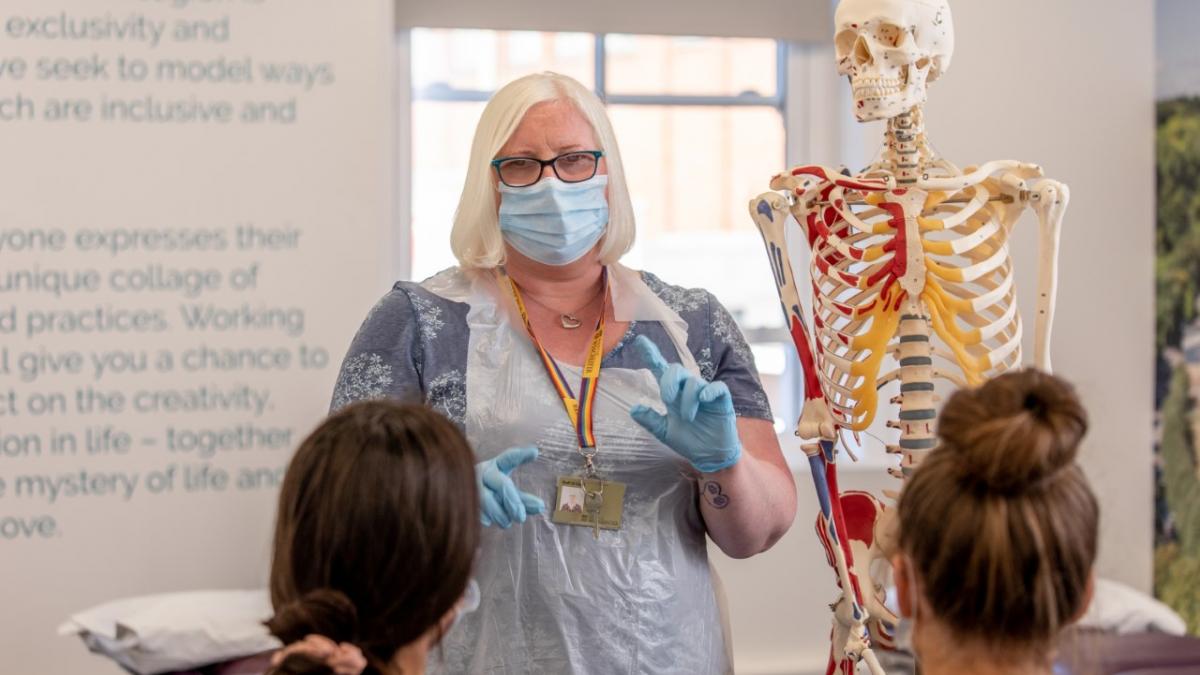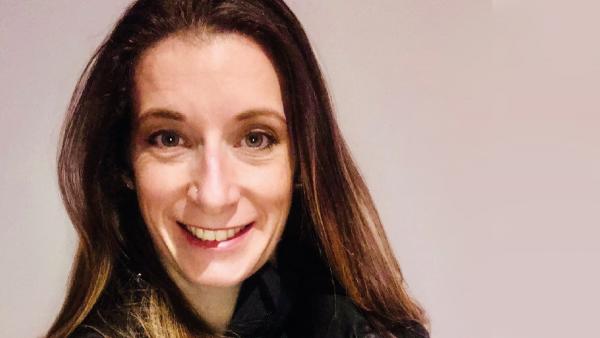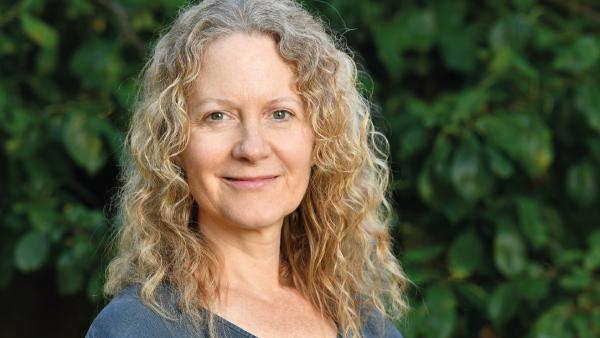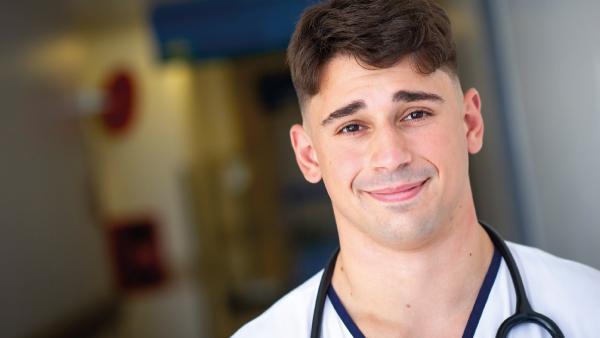As we celebrate UK Disability History Month, Radhika Holmström speaks to four physiotherapists about working with their disabilities

Making History
It is only 26 years ago that discrimination against disabled people became illegal. Until the Disability Discrimination Act 1995 was passed, people with physical, learning or sensory disabilities or impairments had absolutely no redress against being excluded from buildings, transport or employment.
Legislation has made some big differences and employers are now legally required to make ‘reasonable adjustments’ to enable disabled employees to do their job, rather than refusing outright to give them a job. Yet it’s still far from a level playing field (quite literally, in the case of many people with mobility problems). There is a huge range of different disabilities, not all of which are immediately visible and not all of which are taken seriously. And even today, disabled people are twice as likely not to be in employment as their non-disabled peers.
That is why events like UK Disability Month – itself only in its 12th year – are so important. The month, which runs from 18 November to 18 December, aims to challenge the disablism far too many people face; and also to celebrate the lives of disabled people, both past and present. As part of that we spoke to four physiotherapists with disabilities about their experiences, and how their disability has or hasn’t impacted on their professional lives.
‘Reach out to the community’
Glasgow-based MSc physio student Rebecca (Bex) Francis was only diagnosed with hearing loss at the age of 21, during her undergraduate degree. ‘They don’t really know the cause of it, though they think it’s from when I had meningitis when I was two,’ she explains. ‘I never had any support or hearing aids all the way through school. Everyone thought I was disruptive or not very academic but I just couldn’t hear what was going on or what I was being asked. Then when I was a teenager I developed tinnitus as well. Some days I can hear quite well; on others, when the tinnitus is bad, it’s very different.’
Like many people, Bex devised her own coping strategies ‘I developed very good lip-reading skills and I did a lot of self-directed revision for GCSEs. And I did well in the exams as a result.’ She ended up with a university place to study applied biology, took up rugby and applied to join the Army Reserve. ‘I did very well in all the physical assessments, but then they did a hearing test and for the first time I was referred, finally diagnosed with moderate hearing loss and given hearing aids.’

It’s taken a while to get used to them, and the quality has varied, but the ones she has now are very good. ‘The benefits far, far outweigh the disadvantages,’ she says.
Alongside the aids, Bex also started playing for the England Deaf Womens Rugby team. ‘My advice to anyone who’d recently been diagnosed would be to reach out to the community. When I started playing for the team I found my network of other people with hearing impairments – people I can just get in touch with to ask about their experience and advice. It’s how I met some of my best friends too.’
Inadvertently, it was also through rugby that Bex first came into contact with physiotherapy when she ruptured her anterior cruciate ligament. From there, she started training and working in the field herself and she has just completed an MSc in the subject at Edinburgh Napier University. Her university’s disability support service has been very good, she feels, and she’s been equipped with specialist microphones that she was not aware of before. ‘One of the odd positives of Covid-19 is that I’ve had to embrace the technology, because I can’t lip read through a mask. However, there’s only so much they can do. For instance, in settings where everyone has had to be masked I’ve been marked down on communication even though I’ve made it perfectly clear that I am hard of hearing. And we’ve not really been able to find a way through that. It’s NHS policy to keep a mask on, which I understand, but it means there is very little middle ground for people who’re hard of hearing.’
Her hearing loss is one of the issues she is factoring into her future career choices. ‘I’m really enjoying a placement on an orthopaedic trauma ward at the moment, and it’s an area I’d like to pursue. I also find it usually much less noisy, and less stressful, than outpatients for instance.’
As the equality, diversity and belonging student rep for the CSP student reference group, Bex feels it is very important to get disability issues raised with universities, and also with workplaces.
If people need reasonable adjustments, organisations like the CSP should be able to direct employers, practitioners and students to where they can find out more. I want to create a guide for universities on how they should work with students, too: for instance on placement you have to disclose your own disability and your needs, but not everyone realises this.
Bex has nearly finished her course, including a dissertation on how facemasks affect communication, which achieved a distinction. ‘I’m really proud of myself for getting through this, because it’s not been easy. And I’m also proud of setting up the university physio society and not letting my hearing impairment decrease my confidence for doing that.’
‘You’re not a lesser person’
Cathy Rogers, from Leamington Spa, was already working as a physiotherapist when she became disabled. ‘I trained as a mature student, graduated in 2010 and became a musculoskeletal physiotherapist working predominantly in sports.’ And then in 2018 she experienced a sudden and massive brain arteriovenous malformation (AVM) rupture, resulting in a cerebellar bleed.
‘It was effectively a haemorrhagic stroke. I had no symptoms or warning; I believe that I owe where I am today to the knowledge and the speed of the paramedics.’ She was in hospital for five weeks, and still had a lot of recovery to come when she returned home.

‘My biggest problems by far were losing the ability to walk and balance, and extreme nausea. I also had very poor control of my right side, especially my right arm and particularly with respect to fine motor control. Eating and writing were difficult, and to this day I can just about sign my name, with a quite amazing degree of concentration.’
Her balance is still an issue. ‘I walk with a pole to help give me a reference of where my mid-line is, or I need someone walking alongside on my right.’ Some of the other after-effects of stroke, like stamina, ‘brain fog’ and fatigue, were affecting her too, and to some extent still are.
‘Multi-tasking is a lot more difficult, I’m still quite nauseous. It’s rather like having permanent vertigo. But I’m now reasonably able around my own environment. If people hadn’t known me before they perhaps wouldn’t notice anything physically. I cover it up well!’
Six months after the rupture, Cathy was starting to resume work doing CPD courses (including some neuro rehab ones) and liaising with colleagues who had taken on some of her original workload; and she built up from there. Today, she has resumed clinic work but is doing fewer hours, using more exercise software than before and going entirely paperless.
‘I tend to do a lot more hands-off exercise treatment now and I wouldn’t book someone in for a 40-minute sports massage any more.’ She is also involved in the CSP’s DisAbility network. ‘It’s helped not just in terms of how I work, but also in terms of the professional advice, understanding and support extended to me. I wish I’d joined earlier, because of the support, the encouragement and the things I’ve learned.’
A lot of her patients don’t really notice that Cathy has some physical issues – but there are times when she feels it’s helpful to tell them.
I now have a much greater comprehension of patients, their situation and their motivation, or lack of it,’ she explains. ‘I think having been through this process myself gives me a clearer insight into how patients struggle, and perhaps I now prescribe in a slightly different way in terms of what I’m asking them to do, with a very strong emphasis on the mental side too because I’ve found myself that mental wellbeing is crucial.
‘There doesn’t always have to be a goal set in stone, but you do need a general feeling of purpose, self-worth and positive progression.
‘I firmly believe that a lot of people with long-term conditions don’t fulfil their potential because this aspect isn’t addressed. It’s about realising you still have a part in the world. You’re not a lesser person as a result of what has happened to you. Your own self-worth and self-value are the things that have the greatest effects.’
‘You may have a condition, but it doesn’t have to limit you’
Jorge Cabral is another physiotherapist whose disability – in his case dyslexia – was only diagnosed at university. However, it had already meant that he started his physiotherapy degree at the University of the West of England (UWE), from which he graduated this July, two years later than most of his peers.

‘I first came to the UK when I was five, and a lot of my problems at primary school were assumed because I wasn’t an English speaker,’ he explains. ‘All through school I was termed “bright but struggling”, so I didn’t achieve any of the grades I needed for university. Fortunately UWE has a programme for foundation students that’s based on interview rather than grades. The only area where I did excel at school was sport. I had some sports physiotherapy and then I saw what it did for my badminton coach after a stroke. I was really attracted by the idea that you get to change someone’s life significantly for the better.’
The first year at university was quite a struggle, and Jorge decided he needed to seek a diagnosis. ‘I’d discovered what worked for me and what didn’t, but I knew I had to put in that extra effort compared to everyone else and I wanted to get the support I needed. The results showed I was very dyslexic.’
As a result, he was entitled to support, extra time to enable him to process, someone to help him read, tutoring and recordable devices, software for his laptop and so on.
‘From an academic point of view, an earlier diagnosis might have put me in a very different position now. But I think I have matured more as a person, I’ve gained more of an understanding both of how I learn and also how others learn: I think that is also putting me in a position to fulfil my potential. On the other hand, my notes are a lot slower, despite four years of practice and learning my own way to do it!’
He is now working at Nottingham University Hospitals NHS Trust, working between surgery and ICU in a very fast-past environment that he loves. His dyslexia is part of him and how he sees the world.
‘These days I think “I think very differently from other people”. As someone with dyslexia, you’re essentially following a different pathway and that also can be very helpful. Sometimes I’ll point out something that other people didn’t realise. ‘I feel it gives me more of a creative approach, seeing not just the patients’ physical problem but also the social problems and the other elements.’
Jorge adds firmly: ‘Anything neurodiverse shouldn’t been seen as a negative.
You may have a condition, but it doesn’t have to limit you. It means you’re different. That’s the thing I always try to live by and make clear to others. The support I need is more understanding of how I do my job, and of how I work.’
‘We need to be proud of our differences’
Mandy Pike’s story is slightly different from that of the others because she has always known about her disability. She has albinism which, although not everyone realises, affects the vision quite profoundly including through photophobia (acute sensitivity to light).
‘My vision levels vary according to the light available, I have no depth perception and I have nystagmus’ (a condition in which the eyes make involuntary rapid movements), she explains.

But in some ways she, too, found her own ways round the barriers to her disability.
‘I went through my early life being a little in denial about the impact my disability had on me. I declined a long cane, because I didn’t want everyone to see that I was visually impaired before they met me. My mum and dad fought for me to have mainstream education, and I’m really lucky but I’d always felt like I was different, and it made me force myself into a sighted world. I constructed a life full of constraints that allowed me not to let my disability impact on me. I developed all these strategies, going out only with trusted friends and staying in environments I knew. I’d rely on my parents a lot when I was on placements, or if I started a new job and needed to get to new places, or I’d have to use a taxi.
One of the things I would like people to understand is just how much extra time and effort is needed to access things like text books, IT systems and environments, that people without disabilities, access with ease.’
Mandy qualified in physiotherapy from the University of East London in 1996 and worked in a number of clinical positions before taking up a post as manager of orthopaedics and outpatients for University Hospital Southampton NHS Trust. And it was during that time, after a particularly stressful incident and talking to a visually impaired colleague, that she got her first guide dog.
Her dog, Fable, is an adaptation which has made her life far easier. ‘People asked me why I needed one, but they didn’t see all the constraints and planning I had to do. For the first time ever I was able to leave work when I finished, not finish and wait an hour for a taxi. I could go out to the shops when I wanted. Fable gave me choices in so many areas of my life including my career. On the other hand, she was a very public, visible symbol of my disability – a living thing, too, not something that could be left in a drawer like a long cane. She enabled me to accept my disability and I realised that if people knew I was visually impaired most of them wanted to help. There have been occasions, though, when employers have definitely lagged behind on meeting my requirements, even though I’m legally entitled to the “reasonable adjustments” that enable me to do my job. I eventually got in touch with the CSP and that support was invaluable in getting changes.’
Today, Mandy is a senior lecturer in physiotherapy at the University of Winchester. Her disability, she feels, gives her an insight into long-term conditions and the need to adjust one’s life accordingly. ‘It probably allows me to ask those open questions to patients about how they might want to think about changing their lives, in a way that also incorporates acceptance. Patients sometimes see using a mobility aid, like a frame or wheelchair, as a loss of independence but in fact these things often improve independence, just like my guide dog.’
It also brings a new breadth to her team, and it offers students with disabilities a role model. ‘I hope that I encourage our students to be open about their needs and to seek the support they need in order to succeed in their careers. Empowering them to be their own and others’ advocates is what I hope to achieve. We need to be proud of our differences and of the abilities which are often developed as a result of our disabilities.
‘I could have gone on as I was, and my life was fine, but having my guide dog made things better,’ Mandy concludes.
‘And that’s also what being a physiotherapist is all about: using the things that can improve life.’
Number of subscribers: 2
